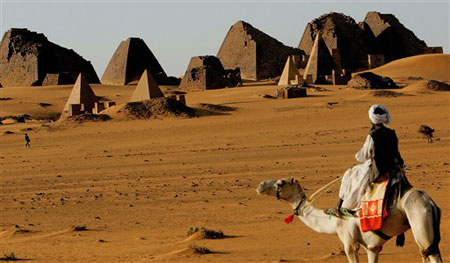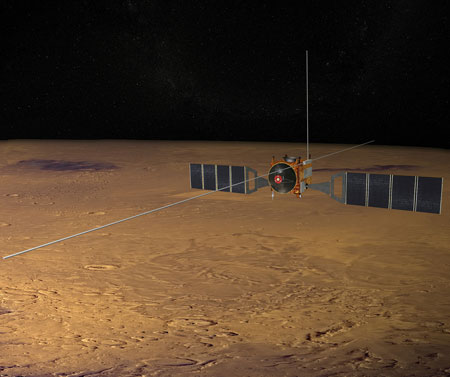Prevent war for water
Technology used by the US Aerospace Agency (NASA) to search for water on Mars can help people avoid many wars because of water resources.

A man rides a camel near the pyramids of the Meroe Desert in northern Sudan on February 26.Photo: AFP.
In 2007, NASA launched a water exploration device called Marsis to explore water below the surface of the red planet. Telegraph said the device consists of an audio receiver, a 40 m long broadcast antenna mounted on a probe on Mars orbit. The antenna can emit radio waves down to a depth of 3.7 km below the surface of the red planet.
Data that Marsis sent shows that there is a large amount of frozen water beneath the desert that covers the surface of Mars.
Dr. Essam Heggy, a NASA earth researcher, said that Mars water search technology could be applied in large deserts in the Middle East and North Africa. Heggy gave an opinion in a water conference organized by the United Nations taking place in Alexandria, Egypt.

Illustration of Marsis device with 40 m long antennae flying on Mars orbit.Photo: nasa.gov.
'Nothing can replace water. But for years people have not tried to find it. Water is a resource, like all other resources, and we have seen many conflicts over resources, ' Telegraph quoted Heggy.
This doctor affirmed that water scarcity could cause many conflicts in North Africa and the Middle East in the future. But if you use devices like Marsis, countries can find water sources located thousands of meters below the desert. Many NASA studies show that many valleys and lakes lie beneath a desert in Darfur, Sudan.
Scientists fear warming will cause more damage to the planet in the next century, including water shortages. For example, while human beings need more and more land, desertification is turning millions of fertile fields into dead lands. According to AFP, a report of the United Nations Development Program shows that 2.87 million square kilometers of land are at risk of becoming desert. Another United Nations study in 2007 indicated that about 50 million people would have to leave their homes because of desertification.
- The reason you should drink warm water instead of cold water
- 3 times to drink water helps prevent heart disease
- How much water to drink before going to bed is good for the body?
- Spray salt into the sky to prevent storms
- Cause hot water bottle leak and how to prevent it
- Effective against saline water by manual methods
- How to handle when the car
- 10 reasons we have to save water and heartbreaking facts
- Prevent bubbles from forming when the water boils
- China's second city cut water because of poisoning
- Water bottles help the owner prevent dehydration
- When an accident occurred, how did the submarine alert?
 Is the magnetic North Pole shift dangerous to humanity?
Is the magnetic North Pole shift dangerous to humanity? Washington legalizes the recycling of human bodies into fertilizer
Washington legalizes the recycling of human bodies into fertilizer Lightning stone - the mysterious guest
Lightning stone - the mysterious guest Stunned by the mysterious sunset, strange appearance
Stunned by the mysterious sunset, strange appearance How do marine animals drink filtered water?
How do marine animals drink filtered water?  Discover the secret of the water buffalo
Discover the secret of the water buffalo  Shocking discovery about the Earth's 'tail'
Shocking discovery about the Earth's 'tail'  Top 10 Unbelievable Ways Animals Survive in Dangerous Environments
Top 10 Unbelievable Ways Animals Survive in Dangerous Environments  Mysterious wonders of the world
Mysterious wonders of the world  The largest animals that lived in the desert, still exist today
The largest animals that lived in the desert, still exist today 